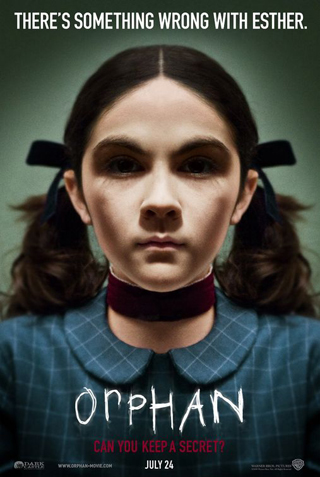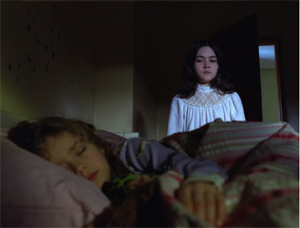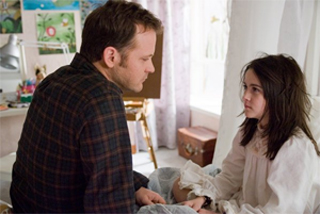|
Orphan
Bringing
an adopted child into an established family can be a challenge.
There’s the chance the adopted child won’t fit
in with the other children, or just isn’t comfortable
in the new home. Then there’s the off chance that
the orphan is a psychopathic manipulator. Ah, the gentle
hazards of adoption.
Looking
to add to the “disturbed child” canon, Orphan
tells of John (Peter Sarsgaard), Kate (Vera Farmiga), and
their seemingly normal family as they look to adopt a child
in the wake of a still-birth Kate suffered roughly a year
before. Unfortunately for them, they adopt the wise-beyond-her-years
but placidly eccentric Esther (Isabelle Fuhrman), who turns
out to be the one kind of different the sometimes-different-is-good
parents are not okay with.
Once
at home with the family, Esther begins a campaign of divisive
manipulation that seems to be aimed at making her the center
of the household at the expense of Kate and the other children.
A good alternate title would be The Hand That Rocks
Mommy.
The
movie opens with a nightmare sequence from Kate that gets
right to her lingering anguish and helplessness regarding
the stillbirth of the daughter she was looking forward to.
The sequence, only about three minutes long, is absolutely
horrifying. Here the director uses sound, interesting camera
distortion and disturbing imagery to create something that
may well rattle many people to their core. It’s unfortunate,
in a perverse sort of way, that nothing else in the movie
can come close to eliciting the same response.
There
is a solid cast working to the benefit of this movie. Vera
Farmiga plays the notes of a mother agonized by the damage
her past as an alcoholic has done to her family (daughter
Max almost drowned while she was passed-out) without letting
it overpower her entire being. Sarsgaard also serves well
to slowly show the cracks in the seemingly perfect family
without forcing us to take sides.
The
standout performances come from the little girls. Aryana
Engineer is adorable as Max, the family’s deaf daughter
who is taken with Esther and quickly ends up over her head.
Isabelle Fuhrman’s portrayal of Esther is the ultra-ironic
bright point of the movie. She is completely endearing when
we first meet her, the perfect mix of eccentric little-girl
habits, freckled smiles, and contrite gratitude, all delivered
with a faint Russian accent.
The
turn becomes all the more impressive when she begins channeling
the spirit of a Russian gangster, threatening to castrate
little boys and gently pitting husband against wife. While
you may find the character and actions of Esther more infuriating
than horrifying, there’s no denying the quality of
the performance.
There
are two ways to play a movie like this. You could keep things
close to the vest, playing up the mother’s paranoia
and keeping the particulars hidden, creating doubt in the
viewer as to what is actually going on. Or you could lay
your cards on the table and reveal the whole game to the
audience. Orphan goes with the latter option, which
makes the movie less about whether or not Esther is evil
and more about just how far she’s willing to go and
when the other characters will catch on.
The
catching on becomes a somewhat troubling sticking point
for the audience. While Kate’s suspicions are triggered
early, everyone around her continues to doubt her even in
the face of mounting evidence. You feel like Kate could
have presented an FBI mug-shot of Esther and be answered
only with shaking heads. The willful ignorance that characters
hold against Kate, especially by John, eventually crosses
the line from plausible deniability of Esther’s actions
into something the G. W. Bush administration would be proud
of. This is where the movie may have benefitted from hiding
some of Esther’s actions or throwing us something
that might be confused as a red herring.
After
the initial sequence, most all of the scares or fear in
the movie come from the standards of false-alarm loud-sound
scares or the old, “What’s going to be behind
this door? NOTHING!” trick. Hence, the movie’s
biggest flaw lies in the fact that it’s a psychological
horror movie trying to be something it’s not: scary.
This
is just not the kind of story that’s going to have
“Boo!” scares, and trying to convince us otherwise
is just cheap. Esther may be an adroit manipulator and handy
with a hammer and vice, but she’s still only three
feet tall. The movie is best served by playing up Esther’s
creepiness, instability, and wiliness to do anything, which
it does, but those efforts are somewhat distracted by the
cheap gooses and tricks.
Orphan
is a serviceable enough psychological horror movie that
makes an unfortunate effort to be something it’s not.
The performances from the actors were so good that during
the first half hour, I was actually lamenting the fact that
it was going to turn into a horror movie and I wasn’t
going to get to see any more of the story about a family
dealing with loss and bringing an eccentric orphan into
their home.
The
movie does have a kind-of twist near the end that was a
necessary evil and won’t be going on any “Top
Ten Twists” lists any time soon. (You have to give
your audience a reason to make it okay to want to see an
8-year-old harmed, after all. Otherwise they’ll just
feel dirty afterwards.) I can tell you that, when all is
said and done, Orphan at least ends up being a
satisfying movie, if nothing else. (And if you too are “satisfied”
at the ending of the movie, please tell me how I can explain
my happiness with the images of the last scene to my mother,
because I don’t think I can manage it on my own.)
|








